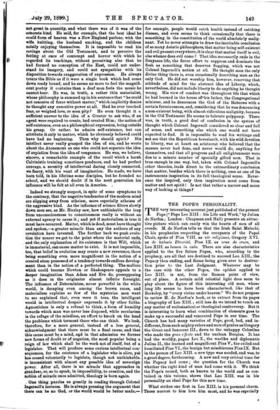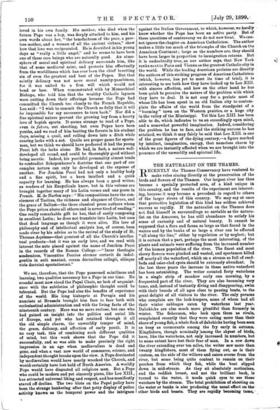THE POPE'S PERSONALITY.
THE very interesting account just published of the present Pope (" Pope Leo XIII.: his Life and Work," by Julien de Narfon ; London : Chapman and Hall) presents an attrac- tive picture which can easily win the hearts of men of all creeds. M. de Narfon tells us that the Irish Saint Malachi, in his prophecies respecting the occupants of the Papal Chair, spoke of Pius VIII. as vir religiosus, Gregory XVI. as de balneis Etrurial, Pius IX. as crux de cruce, and Leo XIIL as lumen in ccelo. There are also characteristics applied to the five future Popes, who, according to the prophecy, are all that are destined to succeed Leo XIII., the Papacy then ending, and Rome being given over to destruc- tion prior to the Last Judgment. Whatever may be the case with the other Popes, the epithet applied to Leo XIII. is not, from the Roman point of view, out of place. A certain mild celestial light does seem to play about the figure of this interesting old man, whose long life seems to have been characterised. like that of Berkeley, by " every virtue under heaven." We do not propose to review M. de Narfon's book, or to extract from its pages a biography of Leo XIIL ; still less do we intend to touch on any matter of ecclesiastical or theological controversy. But it is interesting to learn what combination of elements goes to make up a successful and venerated Pope in our time. The Church has had many varieties of Pope, good, bad, and in- different, from such mighty rulers and men of genius as Gregory the Great and Innocent III., down to the unhappy Celestine who made the gran rifiuto and the unclean Borgias. It has had the worldly, pagan Leo X., the warlike and diplomatic Julius IL, the learned and magnificent Pins V., the exiled and humiliated Pius VI., the benign but mischievous Pius IX. But in the person of Leo XIII. a new type was needed, and was, to a great degree, forthcoming. A new and very critical time for the Papacy had come ; the question for the Church was whether the right kind of man had come with it. We think the Pope's record, both as known to the world and as con- tained in this volume, shows that Leo XIIL was in his personality an ideal Pope for this new time.
What strikes one first in Leo XIII. is his personal charm. Those nearest to him love him most, and he was especially loved in his own family. His mother, who died when the future Pope was a boy, was deeply attached to him, and his own words about her, " the benefactress of the poor, a peer- less mother, and a woman of all the ancient virtues," show how that love was reciprocated. He is described in his young days as " really a little angel," and he seems to have been one of those rare beings who are naturally good. An atmo- sphere of moral and spiritual delicacy surrounds him, like that of some medieval saint, and protects him effectually from the worldliness which has ever been the chief besetting sin of even the greatest and best of the Popes. But that saintly delicacy was not mere moral namby-pambiness, for it was united to a firm will which would not bend or bow. When remonstrated with by Monarchical Bishops, who told him that the wealthy Catholic laymen were cutting down their offerings because the Pope had committed the Church too closely to the French Republic, Leo said : "I wish to commit the Church so fully that it will be impossible for my successors to turn back." Nor did a fine spiritual nature prevent the growing boy from a hearty love of boyish sports. It seems strange to read of a Pope, even in futuro, out shooting, but even Popes have been youths, and we read of him beating the forests in his student days, missing a quail, and rolling down into a ditch while snaring larks with a net. Quails are proper game for sports. men, but we think we should have preferred it had the young Pecci left the larks alone. He had, in fact, a nature well- developed all round, and could be thoroughly good without being ascetic. Indeed, his youthful personality almost tends to contradict Schopenhauer's doctrine that one part of our complex nature can only be developed at the expense of another. For Joachim Pecci had not only a healthy body
and a fine spirit, but a keen intellect and a quick capacity for learning. He has always been a good writer, as readers of his Encyclicals know, but in this volume are
brought together many of his Latin verses and one poem in French. M. de Narfon says : " His compositions have the con-
ciseness of Tacitus, the richness and elegance of Cicero, and the grace of Sallust—the three classical prose authors whom the Pope prizes above all others and is never tired of reading."
One really remarkable gift he has, that of easily composing in excellent Latin; he does not translate into Latin, but uses that dead language as though it were alive. His love of philosophy and of intellectual analysis has, of course, been made clear by his advice as to the revival of the study of St. Thomas Aquinas—that greatest of all the Church's intellec- tual products—but it was an early love, and we read with interest the note placed against the name of Joachim Pecci in the records of the Roman College :—" Inter theologim academicos, Vincentins Peccius strenue certavit de indul- gentiis in atria maxima, coram doctoribus collegii, aliisque viris doctrini spectatissima."
We see, therefore, that the Pope possessed saintliness and learning, two qualities necessary for a Pope in our time. No scandal must now cloud the Papal Chair, no lack of acquaint- ance with the subtleties of philosophic thought could be tolerated. But the Pope had also the benefits of experience of the world. His long bishopric at Perugia and his nunciate at Brussels brought him face to face both with ecclesiastical administration and with the living facts of the nineteenth century. Here was no mere recluse, but one who had gained an insight into the politics and social life of Europe, and yet who had retained through it all the old simple charm, the unworldly temper of mind, the grace, delicacy, and affection of early youth. It is no easy task, this of combining such different qualities of mind, but this work shows that the Pope did it successfully, and so was able to make precisely the right impression in an age when medimvalism is dead and gone, and when a vast new world of commerce, science, and independent thought breaks upon the view. A Pope dominated by medirevalism would have nearly wrecked the Church, and would certainly have lost hold of North America. A worldly Pope would have disgusted all religious men. But a Pope who could be modern and yet sincerely pions, like Leo XIII., has attracted universal liking and respect, and has manifestly staved off decline. The two blots on the Papal policy have been the strange hankering after that petty display of police activity known as the temporal power and the intrigues
against the Italian Government, to which, however, we hardly know whether the Pope has been an active party. But of these questions of controversy we do not now treat. We can- not ignore the chapter on American Catholicism. The author makes a little too much of the triumphs of the Church on the American Continent ; large as the numbers are, they should have been larger in proportion to immigration returns. But it is undoubtedly true, as our author says, that New York ranks next to Paris and Vienna as the greatest Catholic city in the world. While the leading American prelates are directly the authors of this striking progress of American Catholicism (which, however, has yet to meet its time of trial), it is interesting to see both how they have looked up to Leo XIII. with sincere affection, and how on the other hand he has been quick to perceive the nature of the problem with which they have to deal. It is not easy for a prelate most of whose life has been spent in an old Italian city to contem- plate the affairs of the world from the standpoint of a "booming" town on the Western prairies, or a huge city in the valley of the Mississippi. Yet this Leo XIII. has been able to do, which indicates to us an exceedingly open mind, and a somewhat powerful imagination. Indeed, considering the problem he has to face, and the striking success he has attained, we think it may fairly be said that Leo XIII. is one of the great figures of the dying century,—a figure marked by intellect, imagination, energy, that nameless charm by which we are instantly affected when we are brought into the presence of the unworldly and spiritual life.



































 Previous page
Previous page